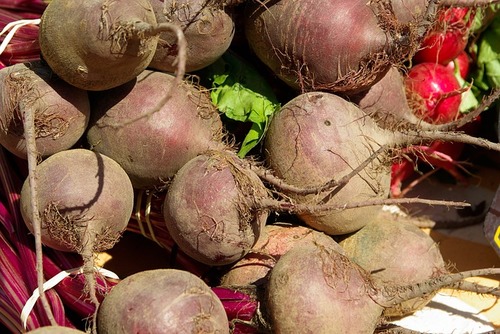Are Beets Bad For You?
Also Known As: table beet, garden beet, golden beet
Short answer
Beets are quite good for you and provide many nutrients that will keep you functioning optimally. Those at risk for kidney stones should enjoy them in moderation, but otherwise, beets are an extremely nutritious choice.
Recommended Alternative
Very healthy and numerous health benefits. Harmful qualities may be associated, but aren't usually serious.
View Full Grading System
Category 'A'
Very healthy and numerous health benefits. Side effects are rare. Things rated an 'A+' are typically necessary for survival (for example, water).
Very healthy and numerous health benefits. A few harmful qualities may be associated, but only under certain circumstances such as an allergic reaction.
Very healthy and numerous health benefits. Harmful qualities may be associated, but aren't usually serious.
It is important to note that even the best things in life can become bad in immoderate amounts. So, although something may be rated an 'A+', overconsumption/overdoing can bring unwanted effects.
Category 'B'
Very beneficial to your health. Things rated a 'B+' may have a few harmful qualities to pay attention to.
Overall beneficial to your health. Things rated a 'B' may have some harmful qualities to pay attention to.
More beneficial to your health than not. However, harmful qualities are most likely associated and shouldn't be overlooked.
The main difference between category 'A' and category 'B' is the harmful qualities typically present in 'B' items. Serious side effects are usually uncommon, but are still possible and should be taken note of.
Category 'C'
Both beneficial and harmful qualities associated. Things rated a 'C+' are typically a bit more on the beneficial side. Still, moderation is important.
A fairly even ratio of beneficial and harmful qualities. Moderation is important. Very general topics that can lean towards both sides of the spectrum will be placed here as well. Rice, for example, can be good or bad depending on the type.
More harmful than beneficial. Side effects are common, especially when consumed/done excessively. Moderation is very important.
Category 'C' usually denotes to both good and bad qualities. When it comes to this category, it is important to keep this word in mind: moderation.
Category 'D'
Harmful to your health. Although benefits may be associated, the bad most likely outweighs the good. Moderation is very important.
Harmful to your health. A few benefits may be associated, but the bad outweighs the good. Moderation is extremely important.
Harmful to your health. Very few, if any, benefits are present. Things in this category should be avoided as much as possible.
Category 'D' is typically for things that are more harmful than beneficial. While consuming/doing something unhealthy once in a blue moon shouldn't hurt, we definitely recommend eliminating 'D' items as a regular part of your routine/diet.
Category 'F'
Category 'F' is for things that fail to bring anything beneficial to the table, and are very harmful to your health. We recommend completely avoiding anything in this category. Long-term side effects of 'F' items are usually very serious.
Category 'N'
'N' stands for neutral. Things placed into this category are generally (a) neither good nor bad for you, or (b) lack the necessary evidence to reach any conclusions.
Long answer
Beets are quite good for your health and contain a few unique ingredients which are highly beneficial. The first of these are phytonutrients called betalains. Studies claim these phytonutrients have anti-inflammatory and antioxidant effects when eaten regularly. These work together to help detoxify the body, thereby lowering the risk of various diseases, including cancer and heart disease. Nitric acid found in beets and beet juice can help facilitate blood flow all over the body and in the brain. In older adults, this can lower the risk for dementia.
Beets are also rich in folate, manganese, and potassium. Apart from helping lower homocysteine levels, folate is also a key player in reducing blood pressure and is especially important in the prevention of neural tube defects. Manganese is important in maintaining healthy skin, as well as in bone production, while potassium is important for bones and muscles and also serves as an electrolyte. Beets also contain fiber, which helps maintain a healthy digestive system, reduce cholesterol, and lessen the risk of cardiovascular disease. The betanin pigments which give beets their rich hue have been shown to reduce the harmful effects of carcinogens on human cells. While these same betanin pigments may cause a reddening/discoloration of the urine or stool, this harmless anomaly is a small side effect for such vast health benefits.
It is important to consider, however, one potentially harmful effect of consuming beets frequently. Due to the high level of oxalic acid found in beets, they pose a risk of causing kidney stones and gall stones. For the same reason, a diet high in beets can also contribute to gout.
Possible long-term side effects
Ingredients to be aware of
Benefits
- reduces inflammation
- prevents cancer
- prevents heart disease
- strengthens bones
- inhibits tumor growth
- decreases risk for dementia
Our Wellness Pick
(what is this?)
Organic Red Beets
- Whole, peeled
- Pre-cooked
- Salad ready
- Rich in nutrients
- Organic product
Learn More!
Please turn your Ad Blocker off to see this content. Thank you!
Thank you for your feedback!
Written by Jeff Volling
Published on: 02-06-2016
Last updated: 12-15-2023
Thank you for your feedback!
Written by Jeff Volling
Published on: 02-06-2016
Last updated: 12-15-2023

 Approved by
Approved by 















